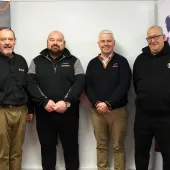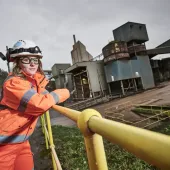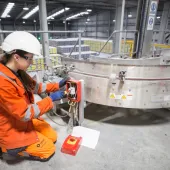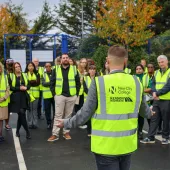Informing the Future
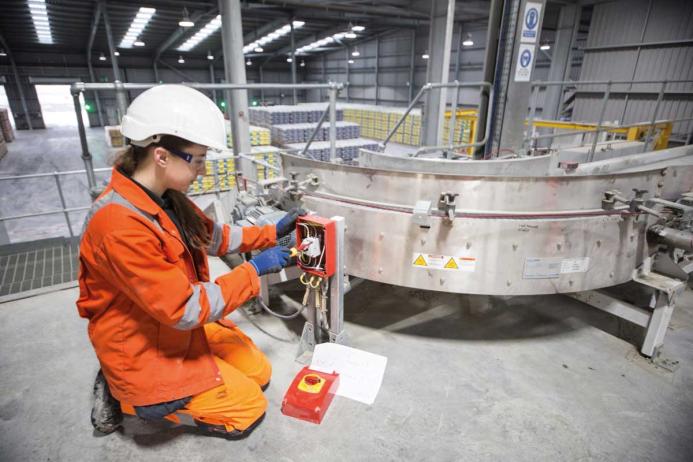
First published in the June 2024 issue of Quarry Management
Learning from the Labour Market Intelligence Study
Results of the 2023 Labour Market Intelligence Study (LMIS), undertaken on behalf of Minerals Matter, regarding the current challenges facing the workforces of the quarrying, mineral products, and mining sector will be available as an executive summary at Hillhead 2024, on stand H2.
More than 300 companies were contacted to complete the online survey between 10 July and 1 September 2023. A total of 91 responses were received, representing a response rate of 30%.
Beyond the answers revealed by the research, the LMIS provides significant data to inform longer-term strategic thinking and poses new questions for employers and key sector bodies.
LMIS and the Strategic Forum
The Strategic Safety Forum (SSF) unites industry bodies across the mineral products sector to promote collaboration and co-ordination for the industry’s benefit, focusing on shared goals. Representing organizations of all sizes, the Forum covers the aggregates, asphalt, cement, concrete, precast and masonry, dimension stone, lime, mortar, and industrial sand industries throughout the UK.
Martin Riley Hon FIQ, the current chair of the SSF, emphasises: ‘Consolidated data from the LMIS will guide actions and future planning across standards, skills, and education. This data, collected by the industry for the industry, is crucial for ensuring that standards remain relevant and effective. It is vital for attracting and retaining a diverse workforce and supports the critical work of Minerals Matter in raising the industry’s profile among the next generation.’
A key focus of the SSF is the elimination of harm from the Fatal 6, which are recognized as the leading causes of fatalities and serious injuries in the sector. SSF members acknowledge that baseline data on education and skills within the sector is essential for enhancing competence and providing the necessary knowledge and qualifications that will advance the industry. Ensuring that learning and development pathways covering vocational training and professional education programmes are navigable and accessible to everyone working in the sector will provide an additional advantage in attracting the best talent to this industry.
Why is the industry experiencing recruitment challenges?
The legacy of the pandemic and ongoing geopolitical events has created turbulence, still sending waves of uncertainty across the economy. This certainly has not helped with planning, demand, and the supply of mineral products. It is a less-than-welcome backdrop in which to confidently invest in both plant and people.
Unsurprising, therefore, that the LMIS found that the sector is still experiencing recruitment challenges across a wide range of roles, and ongoing skills needs, particularly in areas relating to new technologies and engineering (mechanical and electrical).
Nevertheless, it also revealed that employers have an increased appetite to recruit younger workers though some barriers remain when trying to recruit workers from younger demographics, including apprentices.
The true nature of any barriers that exist for younger workers, whether they be misconceptions, eg negative sector perceptions, conflation of historic perceptions of mining, or a lack of awareness of the career opportunities and knowledge of the critical link between mineral products, a thriving society, and a sustainable future, will need to be understood.
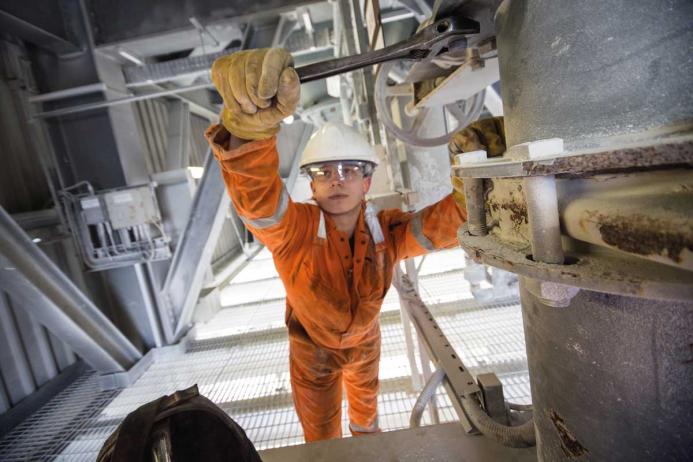
Minerals Matter – collective responsibility
Minerals Matter is uniting the mineral products sector to work together to tackle the issues identified by the industry around recruiting and retaining people from a diverse population. In doing so the sector will be better placed to drive innovation, increase social mobility, and ensure the sector continues to play its vital role within the economy.
Minerals Matter understands that collaborating with a wide range of organizations that align with our aims and objectives, is the key to making a real difference. By working with some key strategic partners who are helping to raise the profile of the sector, ensures employers’ voices are heard and opens doors to some fantastic opportunities that can benefit employers and the sector.
The industry needs to think about affecting all phases of education, raising aspirations from primary through secondary by engaging with and capturing the young minds. It needs to ensure young people have regular opportunities to experience and be inspired by working environments.
‘The need for industry to work consistently with both primary and secondary education to build a greater awareness of the opportunities available can help deliver long-term recruitment to the sector. One way to do this is for more people to become Minerals Matter STEM Ambassadors, each of whom can play a vital role in promoting the career pathways that can resonate with young people,’ commented James Thorne, chief executive officer of the Institute of Quarrying and the Mineral Products Qualifications Council.
Diversity, demographics, and the industry workforce
Having a diverse workforce is more than just making a moral or ethical standpoint; it provides a strategic advantage. It enhances creativity, decision-making, market reach, employee engagement, and economic performance. Organizations that embrace diversity are better positioned to thrive in an increasingly global and competitive market.
The LMIS revealed almost two thirds (65%) engage in the quarrying of stone, sand, and clay; 29% in the manufacture of concrete; and a further 23% in the manufacture of articles of concrete, cement and plaster (including precast and pre-stressed concrete products).
As in 2019, most of the workforce (91%) is employed full time and the majority (55%) of employees are over 45 years of age. Whilst the sector is still predominantly (80%) made up of male workers, this has declined from 2019 (89%), with the proportion of females almost doubling from 11% to 20% over the same period.
Attracting and retaining new and diverse talent remains a challenge, but the industry recognizes the critical importance of fostering inclusivity in all aspects of its operations. This commitment is evident in its efforts to provide equitable opportunities through training and development programmes, implementing well-being policies, and enhancing staff facilities. Continuous progress in these areas is essential, and there must be no room for complacency to ensure these advancements are sustained.

Softer skills training needed
The biggest change since 2019 identified by the LMIS is in the need for training in leadership and management skills, which has seen the immediate need increase from 3% to 18%, with a further 59% seeing a need for training in the future.
Developing leaders has been a pivotal strategy for the Institute of Quarrying. Providing opportunities to access lifelong learning and promoting the benefits of continuing professional development (CPD) is at the core of being a member, along with developing professional networks to help individuals learn and grow as their experiences grows.
There is also a cultural shift for individuals from being the overseers of production to more sophisticated thinking via knowledge of the whole quarry operation, not just expertise in a single area. MPQC’s comprehensive range of driver and industry training also looks holistically at best practice and a greater understanding of the impact of the site team on performance, efficiencies, and results.
Fit-for-purpose apprenticeships
Apprenticeships can offer employers a range of key advantages including addressing skill shortages, enhancing employee retention, and fostering innovation. Additionally, they contribute to building a future workforce, and help with promoting diversity and inclusion. By investing in apprenticeships, employers can build a steady supply of skilled, loyal, and motivated employees, supporting the long-term success and sustainability of their businesses.
Apprentices bring energy, innovation, and digital know-how. They drive businesses to be responsible and ethical and are ready to challenge the status quo in the pursuit of excellence. The mineral products technician higher apprenticeship delivered through the Centre for Mineral Products at the University of Derby is an excellent example of a qualification tailored for different pathways within the sector. The qualification prepares individuals by wrapping the required technical knowledge around softer skills such as problem solving, communication, and team working. Investing in apprentices is investing in the future leaders of the industry.
LMIS revealed that nearly two thirds (63%) of employers have recruited young people (aged 16–19) in the last three years, an increase from 55% in 2019. The majority (62%) of these have been apprentices with most reporting taking on at least two apprentices.

Vacancies increase amidst societal factors
Almost two-thirds (62%) of respondents report having vacancies to fill; this is a substantial increase on the 38% reported in the 2019 LMIS. There are noticeable differences by size of company with 88% of large companies and 77% of medium-sized companies having current vacancies, compared with 48% and 27% in small and micro businesses, respectively.
Filling job vacancies in the UK is challenging due to a complex interplay of factors including skills shortages, demographic changes, economic conditions, Brexit impacts, and evolving work preferences. Addressing these challenges requires co-ordinated efforts between employers, trade bodies, skills-setting organizations, training providers, and educational institutions to ensure that the workforce is equipped with the necessary skills to support the needs of the mineral products industry.
New tech, new skills, new opportunities
Looking to the future, over the next five years the need for new skills is predominantly in areas associated with new technologies. Almost two thirds (62%) see automation as an area where there will be a need, with 54% pointing to increased use of autonomous, hydrogen or electric vehicles.
Other areas mentioned include digital robotics (45%), drones (42%), and operational intelligence (41%). Respondents also highlight an increased demand (from 33% in 2019 to 48% in 2023) in environmental and compliance operations, and in engineering, which has increased from 27% to 39%.
The mineral products industry is committed to achieving its Net-Zero commitments. This has led the way in utilizing new technologies and driving innovation through the production of its products as well as harnessing more and better data to improve both operational and environmental performance. A third of the aggregate market is made up of recycled materials and the circularity of products continues to be a focus for product research and development.
LMIS Executive Summary available at Hillhead
‘The report is an excellent read with a lot of data and interesting trends following on from previous LMI surveys. The impacts of the post-Covid economic situation and technological transformation of the sector are evident. It is an invaluable resource that can signpost us towards the creation of a talented pipeline of workers, exceptionally capable of leading the sector into the future,’ said Viv Russell FIQ, IQ President and MPQC Chair.
The LMIS survey is available as an executive summary from the IQ/MPQC stand at Hillhead (stand H2) or can be downloaded from: www.minerals-matter.co.uk/LMIS
Subscribe to Quarry Management, the monthly journal for the mineral products industry, to read articles before they appear on Agg-Net.com


